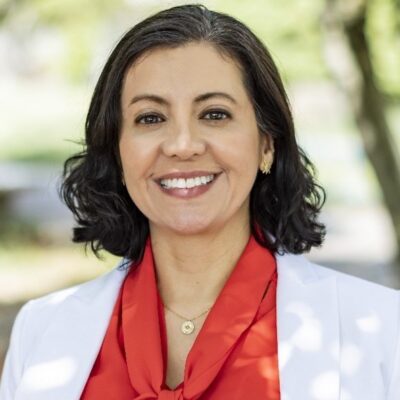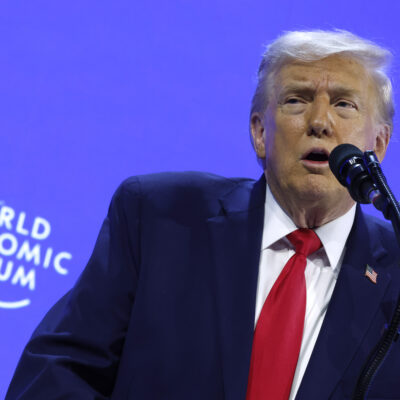
Lev Radin/Pacific Press/LightRocket via Getty Images
How the ICC, ICJ rulings could have deeper, long-term implications for Israel
While the rulings are unlikely to have any impact on the war in Gaza, they are another blow to Israel’s diplomatic standing, analysts and legal experts tell Jewish Insider
On the surface, the separate decisions issued last week by the world’s top two legal forums slamming Israel’s military conduct in Gaza are unlikely to have an immediate impact on the nearly eight-month-old war sparked by Hamas’ brutal Oct. 7 terrorist attacks on southern Israel.
Over the weekend, Israel’s military said it was continuing to battle militants in all parts of the Gaza Strip and on Monday announced it had killed two senior Hamas operatives in an attack that Palestinians said killed dozens of civilians. Hamas also showed no signs of slowing down its assault, firing a barrage of rockets from the Strip’s southernmost city of Rafah into central Israel on Sunday, causing damage to civilian homes as far away as Herzliya.
Despite the continued fighting, however, the International Criminal Court Chief Prosecutor Karim Khan’s intention to seek arrest warrants for Israeli Prime Minister Benjamin Netanyahu and Defense Minister Yoav Gallant – alongside Hamas leaders; and the International Court of Justice’s demand for Israel to “immediately halt its military offensive, and any other action in the Rafah Governorate,” could have broader implications for Israel’s image, its diplomatic standing and its relationships with close allies, including the U.S, in both the short and long term.
The decisions, which Israeli officials wholly rejected, could also have an inverse effect on the legitimacy and status of those two international bodies, analysts and legal experts told Jewish Insider this week.
“The war has been quite disastrous to Israel’s diplomatic standing in the world because it has really put it on a collision course with international institutions and with large parts of the international community,” Yuval Shany, a professor in the faculty of law at Hebrew University and a senior fellow at the Israel Democracy Institute, told JI.
“The average person in the world sees this complete legal crackdown on Israel, they’re not going into the details in the weeds, and it’s just an extremely huge blow to the image of the State of Israel,” said Yaakov Katz, a senior fellow at the Jewish People Policy Institute.
“We are seeing diplomatic relations being cut by some countries, we’re seeing trade sanctions by some countries, we’re seeing limits on military exports, so on the whole I can say that this has not been Israel’s finest hour internationally,” he continued.
Shany said that last week’s decisions, particularly in the ICC, was “a very serious escalation of this sort of criticism.”
“Suggesting that the prime minister of Israel is a war criminal and perpetrator of crimes against humanity – that really is a low point for the country,” he said.
Yaakov Katz, a senior fellow at the Jewish People Policy Institute, concurred, saying that from an “image perspective” the ICC and ICJ announcements were “really bad” for Israel.
“The moment that the world – and your average person – hears that Israel, that its leaders, [could have] arrest warrants issued against them, or that the ICJ says they need to stop a military operation but they’re not listening… it just looks really bad,” he said.
“The average person in the world sees this complete legal crackdown on Israel, they’re not going into the details in the weeds, and it’s just an extremely huge blow to the image of the State of Israel,” added Katz, a former editor-in-chief of The Jerusalem Post.
The author of three books on Israeli military affairs, Katz continued that the courts’ decisions could also have “a long-term impact on things that we don’t yet feel, such as investments and tourism.”
“We’re already seeing this with the researchers and academics,” he noted. “So, this all has a widespread domino effect that is very hard to put your finger on, but it definitely has an impact.”
While Israel has vowed to fight each decision in a legal sense, Katz said it was paramount for “Israel to fix its relationship with the United States,” which in recent months has appeared strained over the Rafah offensive and the question of governance in postwar Gaza.
If Israel moves ahead with the Rafah operation, which appears highly likely, then the ruling by the ICJ, a United Nations-appointed court, Israel will likely be subjected to another Security Council resolution, Katz explained.
In such a scenario, he added, “Israel will be extremely dependent on the United States to veto that resolution.”
The White House declined to comment directly on the ICJ ruling on Friday, with a National Security Council spokesman saying only “we’ve been clear and consistent on our position on Rafah,” without elaborating, according to reports.
Alan Baker, the director of the Institute for Contemporary Affairs at the Jerusalem Center for Public Affairs and Israel’s former ambassador to Canada, said that the decisions issued by these two international bodies – which were established to solve global disputes and prosecute individuals accused of committing the most heinous crimes – could end up having an inverse effect on the courts themselves.
“What the Palestinians have done from the very beginning is to target the ICC as good grounds for politicization against Israel,” he said. “Because they haven’t been able to physically eliminate Israel, they found a very good way of carrying out lawfare to undermine Israel’s legitimacy and turning the ICC into their own backyard Israel-bashing tribunal.”
“Now this is very harmful because the last thing the ICC has wanted is for it to be perceived as being another Israel-bashing tribunal,” Baker said.
“We have to remember that the ICJ is a U.N. body and like the U.N., it also suffers from the same element of politicization that all the international community suffers from,” he said of the other court, noting that its president, Nawaf Salam, was a Lebanese diplomat and stating that he should have recused himself based on a conflict of interests.
Shany also said that the courts’ rulings were politically divisive and had likely left Western capitals feeling uneasy.
“I think there is a sense that some of these international bodies are perhaps becoming too assertive and too aggressive in the way they implement their mandates – and that this might not only be unfair to Israel but could come back to haunt them [other Western countries] sooner rather than later,” he said. “If Western states, including the U.S., are viewing the ICC – and the ICJ – decisions in this way, then the rulings could even actually benefit Israel on some level.”
“The decision was sufficiently ambiguous to give Israel some wiggle or maneuver room, but in practical terms, I think it would be wise for Israel to continue the operation with additional measures of protection, so it can at least show the international community and the ICJ that it is taking the concerns raised by the court really seriously,” said Yuval Shany, a professor in the faculty of law at Hebrew University and a senior fellow at the Israel Democracy Institute.
While there is a growing possibility of pushback against the courts and their decisions among Israel’s allies, Baker said the proceedings were not likely to go away anytime soon. The ICC case, he said, is a continuation of a very long line of complaints and petitions that have been filed to the court by the Palestinians since 2015 when they were admitted as a full member state to the Rome Statute, which governs the court. And the ICJ ruling was part of a petition filed by South Africa accusing Israel of genocide in Gaza.
While the ICJ ruling was widely reported as a call for Israel to halt its war against Hamas, both Baker and Shany highlighted that the decision was far more nuanced. They both pointed to dissenting opinions by Israeli justice Aharon Barak and to the section of Salam’s ruling noting that the fighting should not bring about “the physical destruction” of the Palestinians.
“The court’s ruling walks a fine line between trying to provide better protection for Palestinian civilians, while not excessively limiting Israel’s right to self-defense,” observed Shany.
“The decision was sufficiently ambiguous to give Israel some wiggle or maneuver room, but in practical terms, I think it would be wise for Israel to continue the operation with additional measures of protection, so it can at least show the international community and the ICJ that it is taking the concerns raised by the court really seriously,” he said.
That ambiguity could now be put to the test following Sunday’s IDF strike on Rafah, which Palestinians say killed at least 45 people, including women and children, in a tent city set up for internally displaced civilians. Hours after the attack, several humanitarian organizations sent out a petition demanding that the U.N. Security Council members enforce the ICJ ruling and pressure Israel to immediately halt all fighting in Gaza.






